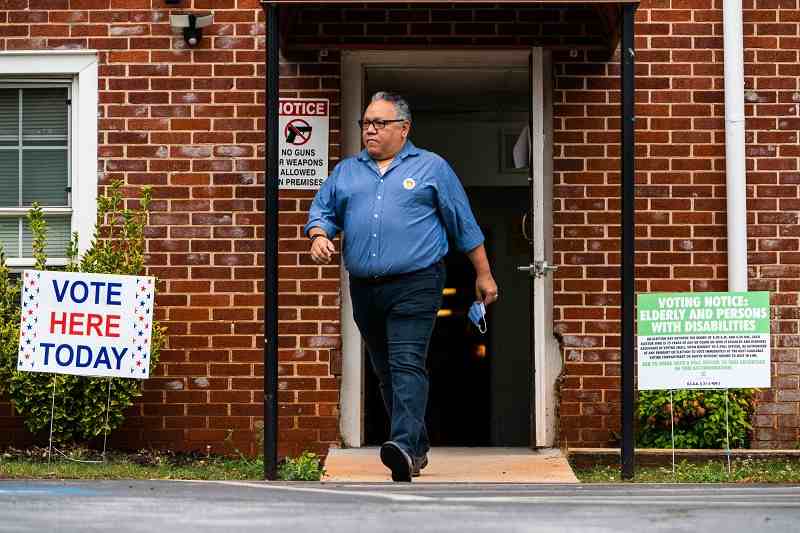
A voter leaves Israel Missionary Baptist Church in Atlanta after casting a ballot in Georgia’s primary elections.
16:17 JST, May 25, 2022
Georgia Republican primary voters on Tuesday rejected former president Donald Trump’s attempt to unseat Gov. Brian Kemp for refusing to join his fight to try to overturn the 2020 election results, as Kemp easily defeated challenger David Perdue for their party’s gubernatorial nomination.
The race between Kemp and Perdue, a former senator, unfolded over the past five months as the highest-profile test of Trump’s pull in this year’s primaries on behalf of candidates running heavily on his false claims that the election was stolen from him. He personally recruited Perdue and actively promoted his candidacy against Kemp. Trump has despised Kemp since the governor certified President Joe Biden’s win in the state.
“Even in the middle of a tough primary, conservatives across our state didn’t listen to the noise. They didn’t get distracted,” Kemp said in remarks to supporters after Perdue conceded.
The governor didn’t mention Trump by name but instead bragged about his record of reopening Georgia during the pandemic and attacked Democratic nominee Stacey Abrams.
“Georgia would be just one variant away from lockdowns, government mandates, schools shuttered and businesses closed,” he said.
Down the ballot in Georgia, another statewide Republican contest was a measure of the intensity behind Trump’s push to dislodge Republicans who bucked his calls to try to block Biden’s win. Secretary of State Brad Raffensperger, who rejected Trump’s pressure to “find” enough votes to make him the winner, was competing against Rep. Jody Hice, a candidate backed by the former president.
With an estimated 65% of votes counted, Raffensberger was leading with 51% support. To avoid a runoff, he would need to win a majority.
All evidence has shown Biden’s win in Georgia, and nationally, was legitimate. And while many Democrats have long railed against Trump’s baseless rhetoric, some powerful Republicans saw the Georgia primary as a potential inflection point that could shift the party away from re-litigating the last election and blunt Trump’s efforts to turn many primaries into score-settling affairs over 2020 and attempts to install loyalists pledging fealty in future elections.
So far this year, Trump has had a mixed record in contested primaries where he made endorsements. J.D. Vance, an author and venture capitalist backed by the former president, won the Republican nomination for U.S. Senate in Ohio. But Mehmet Oz, his pick in Pennsylvania, is locked in a still-unresolved race against a more conventional candidate a week after the primary, which is likely headed to a recount. Trump has faced stiffer head winds in gubernatorial races, where his endorsed candidates in Nebraska and Idaho recently lost.
Tuesday’s results in Georgia amounted to a significant blow to Trump. He has obsessively worked to defeat Republicans who did not work to overturn his 2020 election loss, endorsing and sometimes recruiting their primary challengers. He has celebrated the retirements of House Republicans who voted to impeach him after the Jan. 6, 2021, insurrection at the U.S. Capitol by a pro-Trump mob, and will campaign this weekend in Wyoming for Harriet Hageman, a GOP activist who’s challenging Rep. Liz Cheney, a vocal Trump critic.
The primaries in Georgia on Tuesday were part of a larger array of intraparty contests in states including Alabama, Texas, Arkansas and Minnesota that strategists were watching for indicators of the direction Democrats and Republicans are headed in the run-up to the November midterms.
In South Texas, a heated Democratic runoff pitting Rep. Henry Cuellar against immigration attorney Jessica Cisneros was the latest showdown between the centrist and liberal wings of the party. Cuellar, the only antiabortion Democrat in the House, clashed with Cisneros, who also ran to his left on immigration. Late Tuesday night, Cisneros and Cuellar were in a tight race with an estimated 75% of the vote counted.
In suburban Atlanta, Rep. Lucy McBath bested fellow Democratic Rep. Carolyn Bourdeaux in the year’s second member-versus-member contest. A new Republican-drawn congressional map turned McBath’s seat safely Republican, so she decided to run in an adjacent district against Bourdeaux. McBath out-fundraised Bourdeaux, who was one of the nine House Democrats who demanded that last year’s bipartisan infrastructure bill be separated from the party’s social spending package.
McBath first ran for Congress in 2018 as an activist against gun violence following the 2012 murder of her teenage son. Ronda Harris, 48, attended McBath’s election night watch party to show her support for a woman, who like her, is grieving the loss of a son. Harris was wearing a red shirt that said, “Moms Demand Action for Gun Sense in America.”
“We’re both survivors,” Harris said of McBath. “I lost my son in 2017 to gun violence. It is still an unsolved case. He was murdered. He was coming home from visiting his father, and we’re really not quite sure what happened. . . . The only way I think you can survive something so horrific is to find a way to champion for your loved one, and that’s what I am doing. He’s not here to fight for his rights. He’s not here to fight for his life. I’m here, so that’s my responsibility to stand up and do what I can to prevent other people from having this experience.”
Her remarks came just hours after a deadly mass shooting at a Texas elementary school that claimed the lives of at least 18 children and a teacher.
Republicans were also engaged in heated fights across different states.
In Alabama, a Republican primary for an open Senate seat pitted Rep. Mo Brooks, who had Trump’s endorsement and then lost it; against Katie Britt, a former top aide to retiring Republican Sen. Richard Shelby; and military veteran Mike Durant.
Brooks was in second place late Tuesday, with 29% and Britt at 45%. A majority of the vote is needed to avoid a runoff.
In Texas, state attorney general incumbent Ken Paxton, backed by Trump, beat state land commissioner George P. Bush, the grandson and nephew of two former presidents, in a closely watched Republican runoff.
Rep. Marjorie Taylor Greene, a far-right Republican from Georgia, prevailed over multiple primary opponents, with some Democrats in her conservative district crossing over to support them.
Trump notched an expected win in the Georgia’s Republican primary for U.S. Senate, where former NFL star Herschel Walker won. He will face Democratic Sen. Raphael Warnock.
In Arkansas, Sarah Sanders, Trump’s one-time White House press secretary, easily won her bid to be the GOP gubernatorial nominee.
In Minnesota’s southern tier, 10 Republicans and eight Democrats were competing for nominations to replace the late Rep. Jim Hagedorn, a Republican who died in February after a battle with cancer.
But much of the focus in both parties Tuesday was on the Republican gubernatorial primary in Georgia. The loss there by Perdue threatened Trump’s reputation as GOP kingmaker and to diminish his standing in the party.
Kemp will face Abrams, a former state House minority leader who was unopposed on the Democratic side. Abrams, who lost to Kemp in 2018, is vying to become the first Black female governor in the country.
Voters interviewed Tuesday morning at two polling places in Republican-leaning east Cobb County outside Atlanta expressed strong preference for Kemp over Perdue.
Charles “Stan” Tommasello, 75, a retired Delta Air Lines pilot, said he initially supported Perdue when Trump first threw his support behind him, but later changed his mind.
“At first, I was concerned about the original count of the election and the way [Kemp] strongly supported Raffensperger,” Tommasello said. “I thought that Perdue ran a very lackluster [campaign] and didn’t have the energy I expected of him.”
But Tommasello said he did side with Trump in voting against Raffensperger.
Nicki, a 46-year-old business administrator with the Newton County Board of Education who declined to share her last name, said Trump’s endorsements didn’t sway her; a sentiment reflected in polling data in the state. She voted for Kemp and Raffensperger, commending Kemp for keeping businesses open during the pandemic.
Though she is a Trump supporter, Nicki said the former president should have remained neutral.
“I think Trump should have stayed out of Georgia,” and not get involved “because his feelings were hurt,” she said.
Prominent GOP figures such as former New Jersey governor Chris Christie and Arizona Gov. Doug Ducey hit the trail to vouch for Kemp in the final weeks of the race, urging the party to look beyond 2020. On Monday, former vice president Mike Pence, in a direct rebuke of his former boss, campaigned for Kemp in Georgia.
In a competing tele-rally for Perdue on Monday, Trump sought to convince Georgia Republican voters that Kemp was unable to beat Abrams.
“He’s got too many people in the Republican Party that will refuse to vote,” he said. The former president also took to his Truth Social account Monday to bring up more disproved 2020 election conspiracies.
Perdue said Abrams should “go back where she came from if she doesn’t like it here” – a comment that echoes of when Trump said four Democratic congresswomen of color should “go back and help fix the totally broken and crime-infested places from which they came.” Perdue also said Abrams was “demeaning her own race.”
Outside a Baptist church in Atlanta on Tuesday, Abrams dismissed Perdue’s racist comments, saying she has “listened to Republicans attack me, but they’ve done nothing . . . to articulate a plan for Georgia.”
In neighboring Alabama, Trump and his allies were also a factor. Brooks fell out of favor with Trump after suggesting people not focus on re-litigating the 2020 presidential election. He had been one of Trump’s most ardent supporters, who donned body armor and spoke at the Stop the Steal rally in Washington on Jan. 6, 2021, urging the crowd to “fight” before many of them did just that, overtaking the U.S. Capitol in a violent insurrection.
Trump unendorsed Brooks in March, but didn’t throw his support behind anyone else. The winner of the GOP primary will be the likely successor of Shelby, in a state that leans heavily conservative.
Thomas LaPointe, 32, in Auburn, Ala., said he hoped that would be Britt, who previously worked as Shelby’s chief of staff.
“As somebody who cares about the state of Alabama a lot, I know that Richard Shelby was very good at working the system in Washington and for me, Katie Britt was the candidate who would probably do the best job at kind of continuing that,” he said.
Top Articles in News Services
-

Prudential Life Expected to Face Inspection over Fraud
-

Hong Kong Ex-Publisher Jimmy Lai’s Sentence Raises International Outcry as China Defends It
-

Japan’s Nikkei Stock Average Touches 58,000 as Yen, Jgbs Rally on Election Fallout (UPDATE 1)
-

Trump Names Former Federal Reserve Governor Warsh as the Next Fed Chair, Replacing Powell
-

Suzuki Overtakes Nissan as Japan’s Third‑Largest Automaker in 2025
JN ACCESS RANKING
-

Japan Institute to Use Domestic Commercial Optical Lattice Clock to Set Japan Standard Time
-

Israeli Ambassador to Japan Speaks about Japan’s Role in the Reconstruction of Gaza
-

Man Infected with Measles May Have Come in Contact with Many People in Tokyo, Went to Store, Restaurant Around When Symptoms Emerged
-

China Eyes Rare Earth Foothold in Malaysia to Maintain Dominance, Counter Japan, U.S.
-

Prudential Life Insurance Plans to Fully Compensate for Damages Caused by Fraudulent Actions Without Waiting for Third-Party Committee Review
























